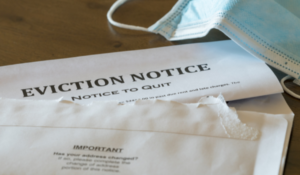
The temporary ban was brought in to protect renters whose incomes were impacted by nationwide lockdown measures, but the Government has confirmed it will be scaled back as the country's coronavirus restrictions gradually lift throughout the summer months.
Housing Minister Christopher Pincher stated: "As COVID restrictions are eased in line with the roadmap out of lockdown, we will ensure tenants continue to be supported with longer notice periods, while also balancing the need for landlords to access justice.
"Crucial financial support also remains in place including the furlough scheme and uplift to Universal Credit".
When does the rental eviction ban end?
The rental eviction ban is set to end on Monday 31st May 2021 and eviction notices can resume from Tuesday 1st June 2021.
Having been extended to 6 months during the pandemic, eviction notice periods will reduce to 4 months from Tuesday 1st June 2021. If lockdown restrictions are eased in time with the Government's current schedule, notice periods are expected to return to the pre-pandemic standard of 2 months' from Friday 1st October 2021.
What are the renewed rental eviction terms?
Although the Government is currently consulting on plans to abolish Section 21 "no fault" evictions, which allow for landlords to evict tenants at any point during their contract without stating a reason, the law has not yet been adjusted.
There are a number of specific circumstances which can reduce the notice period which landlords are required to give a tenant before eviction, as explained in our table below.
| Tenancy breach | Notice required |
| Breach of immigration rules | 2 weeks' notice |
| False statement | 2 to 4 weeks' notice |
| Domestic abuse | 2 to 4 weeks' notice |
| Anti-social behaviour | 2 to 4 weeks' notice |
| 4 months or more rent arrears | 4 weeks’ notice |
| Death of a tenant | 2 months' notice |
In the event that a tenant owes their landlord less than 4 months of rent arrears, the eviction notice period will be set at 2 months' from Sunday 1st August 2021.
Bailiffs have also been asked by the Government not to carry out an eviction if one or more people in the rented household have Covid-19 symptoms or are self-isolating.
For more information about the renewal of rental evictions, visit the GOV.UK website's dedicated page.
What are the rules on rental eviction in the rest of the UK?
Scotland
A similar rental eviction ban has been extended until Thursday 30th September 2021 for anyone living in areas with level 3 or 4 restrictions.
This policy is reviewed every 21 days so could end sooner subject to Government review. Most evictions currently require 6 months' notice.
Wales
A rental eviction ban is in place until Wednesday 30th June 2021, with most notice periods set at 6 months'.
Northern Ireland
There is currently no ban on rental evictions. Until Thursday 30th September 2021, landlords must give 12 weeks' notice of eviction.
What can I do if I am evicted from my rental property?
If your landlord evicts you from your rented accommodation, you do have some options to challenge their decision or find alternative housing.
Challenge your eviction
You can only be evicted if your landlord has followed the proper legal protocol. They must:
- Give you a valid Section 21 or Section 8 notice.
- Get a possession order from court, if you have not left by the date on the Section 21 or Section 8 notice.
- Ask the court for a warrant of possession if you have not left by the date on the possession order.
- Get an eviction warrant from the court - this means that bailiffs can make you leave your home.
If your landlord has yet to take the matter to court, you should first check your Section 21 or Section 8 notice to make sure that their eviction claim is valid. If it is not, you may be able to challenge the eviction and stay in your home.
Shelter offers a number of useful resources which you can use to check the validity of your eviction notice.
Find alternative housing
If you are not in a position to challenge your eviction notice and need to quickly find alternative housing, there are a number of ways in which you can seek help and support.
Contact a housing officer
You can contact a housing officer about your situation and why you are being made homeless to find out if they can help you secure alternative housing.
The housing officer should explain the application process to you. They will look at your situation and decide what measures they can use to help you, such as finding somewhere for you to live or offer you advice about your other options.
The housing officer will consider the following:
- The reason you are homeless.
- If you are in priority need, for example, if you are considered vulnerable because you are disabled or have a long-term illness.
- If you are eligible for help, for example, if you live permanently in the UK.
- If you are about to be homeless, for example, if your landlord has given you a valid Section 21 notice.
- If you are already homeless, for example, if you are staying at a friend’s house because you have successfully been evicted.
You can ask the housing officer for confirmation in writing that your application is being processed. If your council won’t help you, ask them to confirm this in writing - and get their reasons why.
Contact your local council
Your local council has a duty to assess your case if the following apply to your situation:
- You have applied for accommodation or help in keeping or getting accommodation.
- You are homeless or you will be made homeless within 56 days.
If you will be made homeless in the next 56 days and are eligible for help, your local council must help you:
- Keep your accommodation.
- Get suitable accommodation.
Citizens Advice can help you to check if you are eligible for help with homelessness.
Further information for landlords and tenants
For more information for landlords, visit our articles "27 point checklist of a successful buy-to-let landlord" and our guide to landlord's responsibilities,
For tenants, check out our article "Renting a property – a guide to your rights and responsibilities" or browse our 10 tips on how to ensure renting a property goes smoothly.





